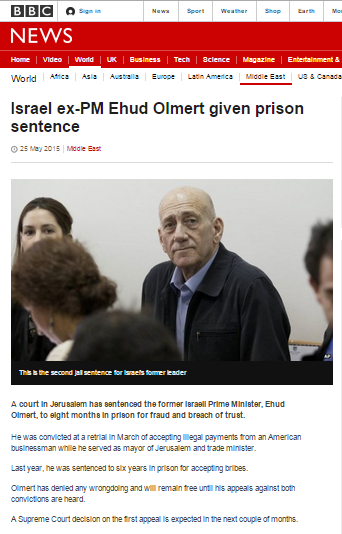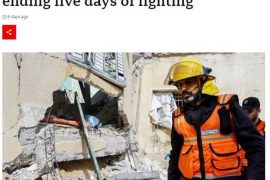The June 11th evening edition of the BBC World Service radio programme ‘Newshour’ included an item (from 37:22 here) described in its synopsis as follows:
“Also in the programme: Syria has confirmed that an air strike it blames on Israel has caused major damage at Damascus Airport”
Presenter Paul Henley introduced the item with unnecessary qualification of the nature of the targets of Israeli actions in Syria. [emphasis in italics in the original, emphasis in bold added]
Henley: “Now Syria has stopped flights to and from the country’s main airport in Damascus until further notice, saying Israeli airstrikes damaged the airstrip and a terminal. An Israeli military spokesperson declined to comment. But for several years now Israel is known to have been attacking what it’s described as Iranian linked targets in Syria, where Tehran-backed forces – including Lebanon’s Hizballah – have been assisting President Assad.”
Henley then brought in his sole interviewee.
Henley: “Mohammad Ali Shabani is an Iranian journalist based in London. He’s editor of Amwaj.media – a website that focuses on news from the Middle East – and he told me what he knew about the attacks on Damascus airport.”
The contribution from Shabani (who is also a doctoral student at SOAS) included nothing that had not already been reported by other media outlets and neither he nor Henley bothered to inform listeners that the attack had reportedly taken place early on the morning of the previous day.
Shabani: “From my understanding the second of the runways – the previous one was bombed previously – has been hit. We also have part of the building hit and as a result flights have been cancelled for the coming weeks. This is what reports have said so far.”
Henley then asked his guest whether there was “any doubt in your mind as to who’s responsible?” to which Shabani replied that he believed that it was not “a non-state actor”. Henley continued:
Henley: “Why the attack now?”
Shabani: “It seems to me that Israel is very keen at this point in time to send a message that it is resolute in fighting not just Iran but also Iran’s allies in the region. We’ve seen also Israel at the same time engage more closely with the UAE. The prime minister was in Abu Dhabi just the other day to meet with the Emirati president. We also have the increasing tensions over the Iran nuclear deal that Israel vehemently opposes and I think the message that it’s trying to send now is that it can act with impunity, that it’s resolute in achieving its aims regardless of what Emiratis may say or do and I think that in itself, it really speaks volumes about the state of the region today and particularly about how it looks under the current US administration what’s really taken a back seat in a lot of this.”
Shabani’s efforts to create linkage between what is allegedly just the latest of many attacks against Iranian weapons transfers that have taken place in recent years and Israel-UAE relations and/or the floundering JCPOA talks were not challenged by Henley.
Henley: “Israel accuses Tehran of flying weapons to Lebanese Hizballah. Is this attack in retaliation for that? Could it be?”
Shabani’s responded with yet more spin:
Shabani: “Those kind of shipments have been going on throughout the Syrian civil war which began back in late 2011 [sic]. So attacks on that area aren’t anything new. The aim is not really to stop those shipments because there are many other ways in which weapons are being, you know, pushed into Syria. We have land routes going through Iraq and that’s another kind of key targets for Israeli airstrikes. Many attacks are taking place around the Iraq-Syria border, ostensibly to prevent another weapons smuggling route. So the idea that striking a runway is going to permanently halt any kind of weapons shipments to Syria and to Hizballah is hard to believe.”
Henley failed to clarify to listeners that in fact no-one has made that latter claim dismissed by Shabani before going on to ask about “the Russian reaction to the airport attacks” and failing to challenge his interviewee’s use of the term Tel Aviv as shorthand for a government that sits in Jerusalem.
Shabani: “Russia I think is being very careful in assessing Israeli actions in Syria. In the past what it has done whenever there has…it wanted to convey displeasure with what Tel Aviv is doing has been to work more closely with the Iranians. So there is possibly right now on the table, particularly when we look at how President Raisi and President Putin held a phone conversation just the other day, right before the vote in the IAEA about the Iranian nuclear deal, the Iranian nuclear programme, the possibility of the [unintelligible] airport in north-western Syria potentially being used for some shipments of Iranian goods into the country.”
Henley next asked whether the fact that Russia is “focused principally on Ukraine” could mean that “other powers are trying to capitalise on Russian eyes being off Syria” to which Shabani replied that he thinks that Russia does not have an interest in creating a vacuum in Syria. Henley’s final question was about “the state of the war” in Syria. Shabani’s response to that question included the bizarre – but again unchallenged – suggestion that the UAE should be consulted about Israeli defence policy and military operations.
Shabani: “…Right now what we’re seeing is the use of the country as a chip in a wider game that looks at how the region is going to evolve in terms of regional alliances. And this is the reason why I brought up the UAE previously. The UAE has played a key role in leading Arab normalisation with Assad regime. And when we consider that the Israeli prime minister was in Abu Dhabi just the other day meeting with the Emirati president and you then have this kind of attack on Damascus international airport, the message that sends is that either the Emiratis understanding of these kinds of policies – in which case they’re undermined in Syria – or they’re not even consulted or considered, which sends a whole other message about the seriousity [sic] of what they’re doing and the consistency of it, which then again tells Assad ‘I don’t have any options except sticking with Russia and Iran’.
While ‘Newshour’ producers were clearly perfectly happy to provide over five minutes of worldwide platforming for Shabani’s Iranian talking points, they did not meet the BBC’s public purpose of providing “factual programming to build people’s understanding” of this story.
Listeners heard no serious explanation of the issue of Iranian weapons transfers to Hizballah via Syrian airports over the years and Shabani’s brief opening reference to a runway at Damascus airport having been “bombed previously” was not clarified. As noted by the Times of Israel:
“Generally, relatively large weapons are thought to be smuggled via Syria on Iranian cargo airlines, which frequently land at Damascus International and the Tiyas, or T-4, airbase, outside of the central Syrian city of Palmyra. The weaponry is then believed to be stored in warehouses in the area before being trucked to Lebanon.
In response, Israel has in the past allegedly struck the runway at T-4. More recently, in missile strikes in April and May, a section of Damascus International near a military base was damaged in a way that shortened the length of a runway to prevent large planes from landing.”
Neither did Henley and his interviewee clarify why the second, civilian, runway at Damascus airport would be a potential target. As explained by Amos Harel at Ha’aretz:
“In recent years Israel has made major efforts to reduce weapons smuggling from Iran to Hezbollah in Lebanon. These efforts have included numerous assaults, mostly from the air, on weapons-smuggling routes from Iran to Lebanon. Israel has also attacked pro-Iranian Shi’ite militia bases in Syria to prevent the Iranian military from entrenching itself in Syria, especially near the border with Israel on the Golan Heights.
Iran’s main efforts aim to improve the precision of the thousands of rockets in Hezbollah’s possession. This is done partly by smuggling satellite navigation systems (GPS) that can be installed on the rockets.
In the past, kits for these systems were also smuggled in Iranian cargo planes landing in Damascus and from there sent in trucks to Lebanon. At the same time, Hezbollah has built underground sites to convert rockets in Lebanon. Some of these were revealed by former Prime Minister Benjamin Netanyahu in a speech to the UN General Assembly almost two years ago.
Iran has sought ways around Israeli disruptions: Recently, some of the best systems have been smuggled in hand luggage on commercial flights. Some of these flights arrive directly to Damascus from Tehran, and some go through specific airports in Europe. Because Israel cannot harm commercial aircraft – which would complicate things with the international community and might lead the northern front to the brink of war – it seems that it is using the attacks to deliver a message to Syria.”
Last month it was reported that:
“On May 20, the IDF’s Arabic-language spokesperson revealed a smuggling operation of advanced military components from Iran to Hezbollah overseen by Seyyed Reda Said al-Din, the son of Seyyed Hisham Safi al-Din, the Chairman of Hezbollah’s Executive Council. The son of the senior official is married to Zainab Soleimani, the daughter of the former Commander of the IRGC’s Qods Force, Qasem Soleimani, and has been exploiting Lebanese infrastructure to facilitate the smuggling of weaponry from Iran to Hezbollah. The IDF spokesperson added that Safi al-Din’s son is using his frequent visits to Iran to coordinate the transfer of advanced weaponry to Hezbollah, using Hezbollah militants, who bring the military components on board civilian flights from Tehran to a European country, and from there on civilian flights to Damascus or Beirut.”
The BBC did not give any coverage to that announcement at the time. Had it done so, it would perhaps now be better placed to provide its audiences with a proper explanation of the background to this latest story – including the serious issue of Iran’s smuggling of armaments on civilian flights – rather than just a collection of opportunistic Iranian talking points.





